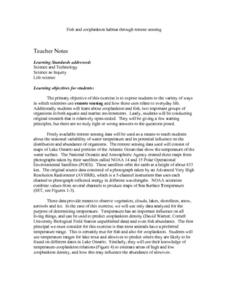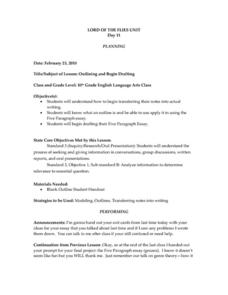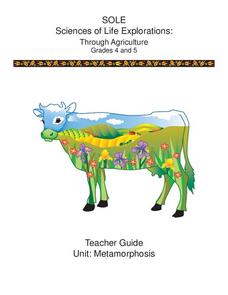Curated OER
You and the Military
Do military recruiters plan to visit your campus? If so, the visit presents an opportunity for class members to engage in a series of action projects. Class members interview recruiters, propose a PTA meeting to discuss the pros and cons...
Curated OER
Fish and zooplankton habitat through remote sensing
Students are exposed to the variety of ways in which scientist use remote sensing and it used in everyday life. They investigate about zooplankton and fish. Students list the two important groups of organisms in both aquatic and marine...
Curated OER
Light and Starch Production in Photosynthesis
Students are given the unique opportunity to see the contrast between parts of a leaf that have photosynthesized and parts of the leaf that have not. This visual image helps students see the results of this biological process. At the...
Curated OER
The Declaration of Independence
Learners analyze the Declaration of Independence. They identify and describe various sections of the document then discuss how the colonists responded to it. As a culminating activity, they write their own declarations of independence as...
Curated OER
Be "Sun-sible" about Heating Water
Learners create a solar water heater. In this solar energy lesson, students conduct an experiment to determine which colors absorb more radiant heat. Learners investigate the relationship of heat loss to insulation. Students then create...
Curated OER
Verbal Moodswings
Finally, a handout that accurately describes the difference between indicative, imperative, and subjunctive verb tenses! Complete with sentences, examples, and even some humor. Never be confused again!
Curated OER
Hamlet Research Paper: Find, Evaluate, and Select Appropriate Research Sources
Help young researchers find credible sources online. Modeling with a Google search for information about Shakespeare’s Macbeth, use a computer projector or Smart Board to show class members how weak the top three search results are....
Novelinks
Lord of the Flies: Outlining and Begin Drafting
Help young writers with the daunting prospect of a five-paragraph essay. Using William Golding's Lord of the Flies, learners work through a short process to shore up their brainstorming and prepare to write a longer essay.
National Science Teachers Association
Hop into Action
Young scientists find out what makes amphibians such unique and interesting animals in this simple life science lesson. After looking at pictures and discussing the characteristics of amphibians, learners complete a series...
Danya International, Inc.
Life Journey through Autism: An Educator’s Guide to Asperger Syndrome
Whether this the first time you've had a learner with Asperger Syndrome in your class, or you have years of experience with learners on the autism spectrum, a booklet about the best ways to accommodate these kids in the classroom could...
Space Race
Sensory Detectives
Test your learners' sensory awareness with three hands-on activities that ask pupils to use their other senses to identify and describe everyday objects hidden from sight.
Center for Learning in Action
Investigating Physical and Chemical Changes
Super scientists visit ten stations to predict, observe, and draw conclusions about the physical and chemical changes that occur when different states of matter—liquid, solid, and gas—are placed under a variety of conditions. To...
Cornell University
Metamorphosis
Looking for an insect unit that addresses multiple skill strategies? Young entomologists explore multiple life cycles of insects that go through metamorphosis. The brainteasers and mobile activity spark learner interest before guiding...
Curated OER
Using Rhythm Instruments to Tell a Story
After watching a video of Peter and the Wolf, and identifying the instruments used to represent each character, class members use rhythm instruments to represent the actions in the song, "What Would I do."
National Library of Medicine
Your Environment, Your Health: The Great Debate—Bottled Water vs. Tap Water in Our School
Should bottled water be sold in schools, or should they only provide tap water? The summative unit in the six-part series encourages scholars debating this topic. The lessons teach how to build an argument, how to gain background...
NASA
Exploring Data
Bring the sun to your class! Young scholars analyze actual solar wind data in the second lesson of a five-part series. Their analysis includes speed, temperature, and density data.















